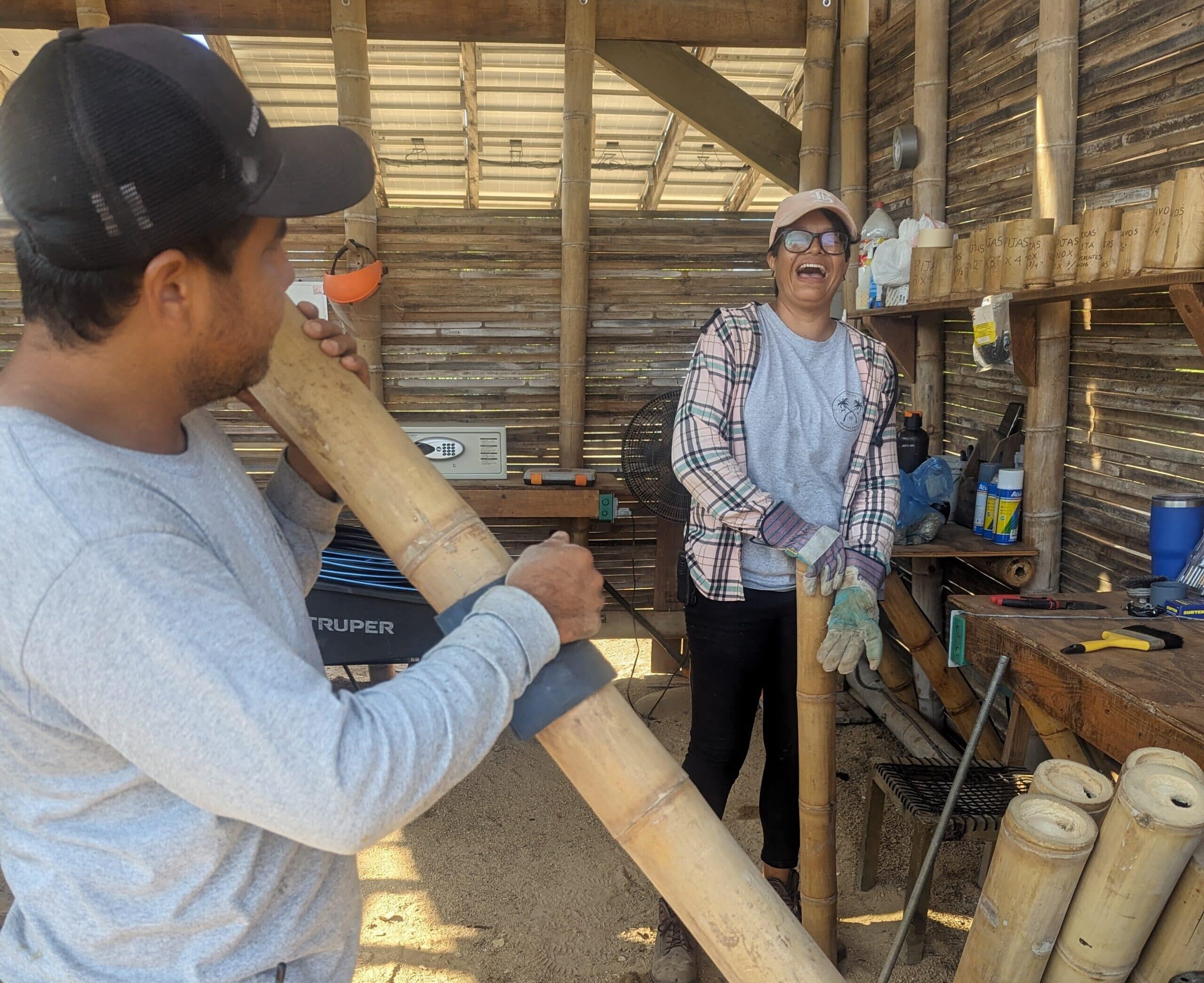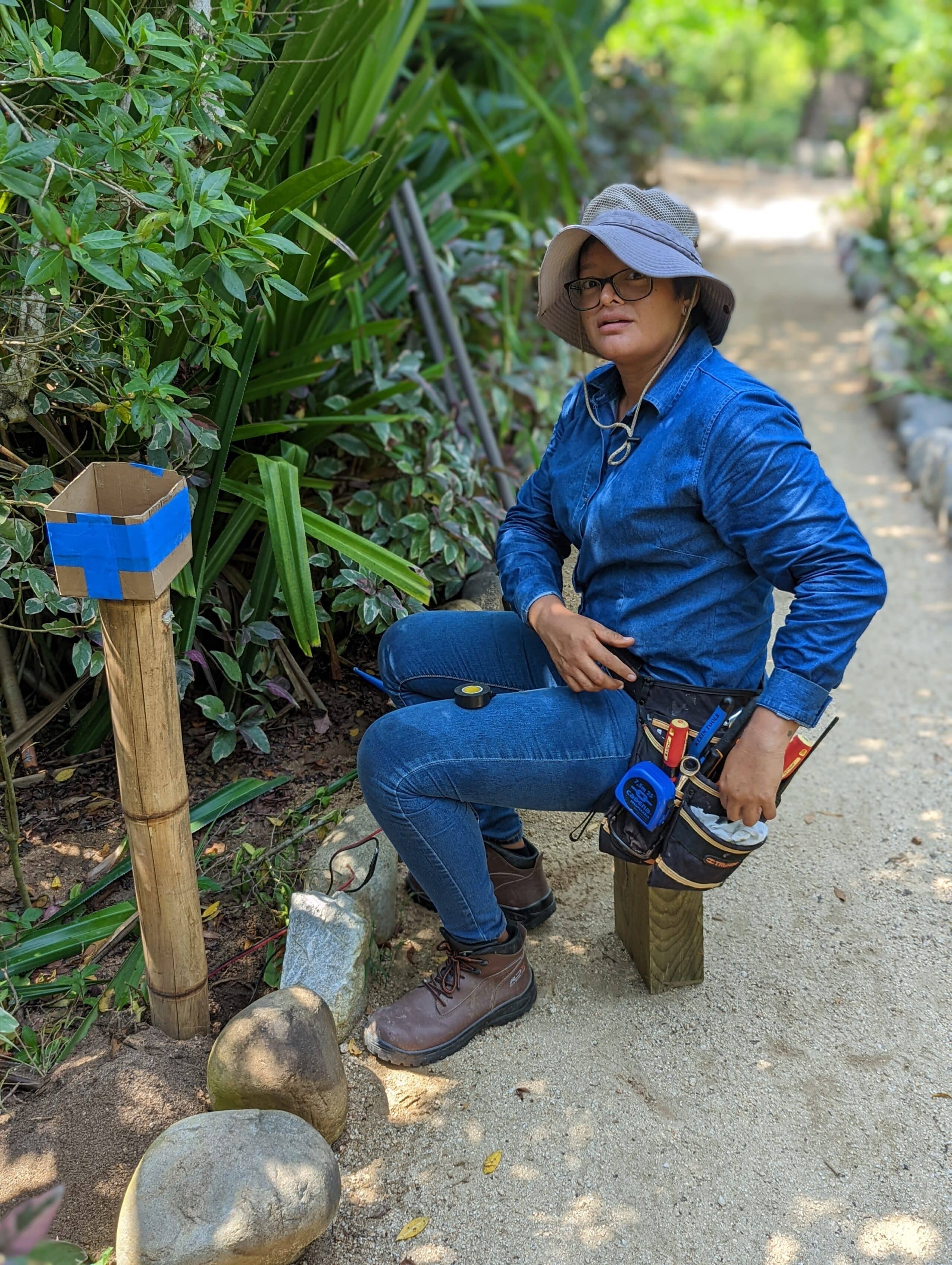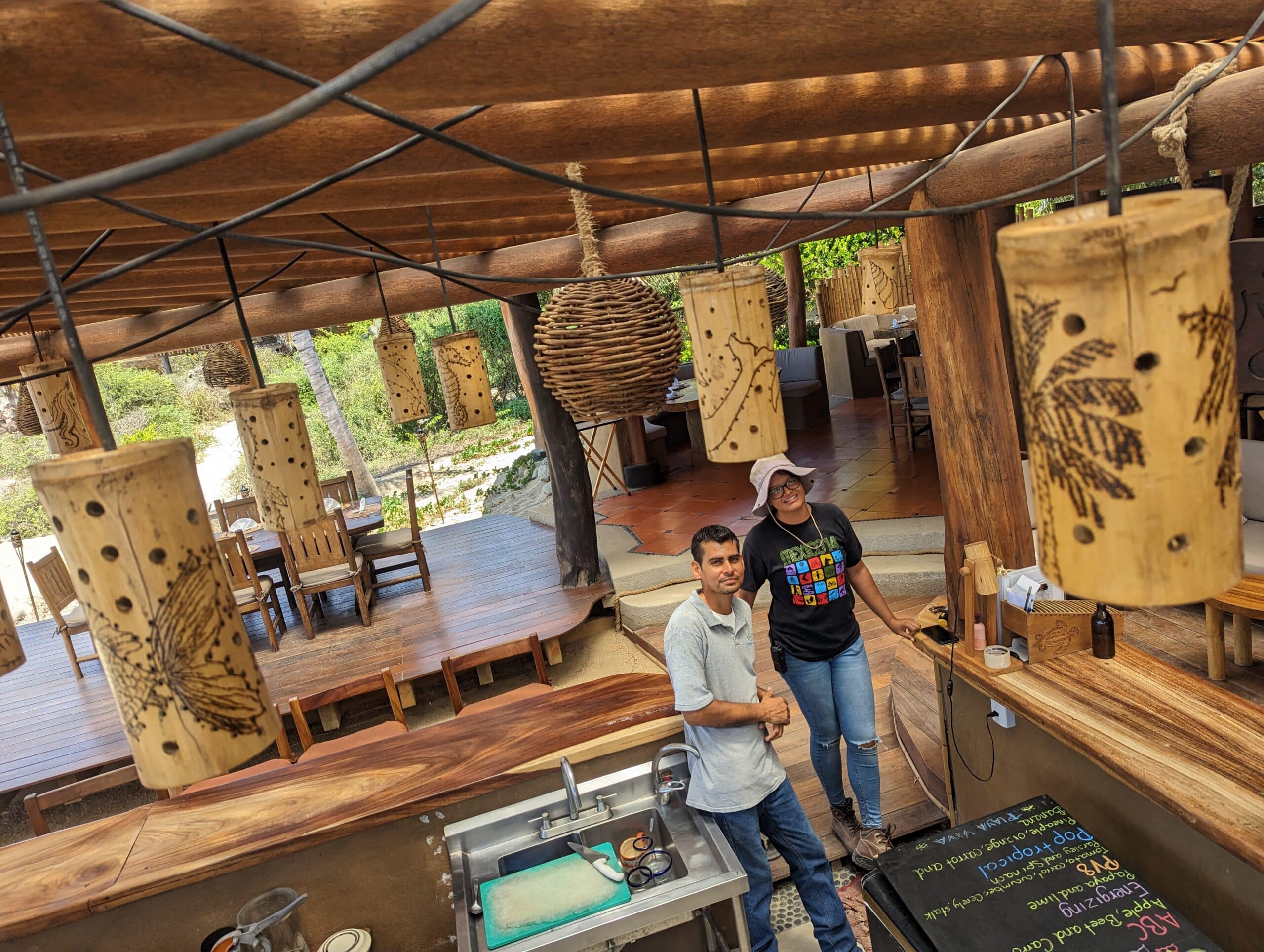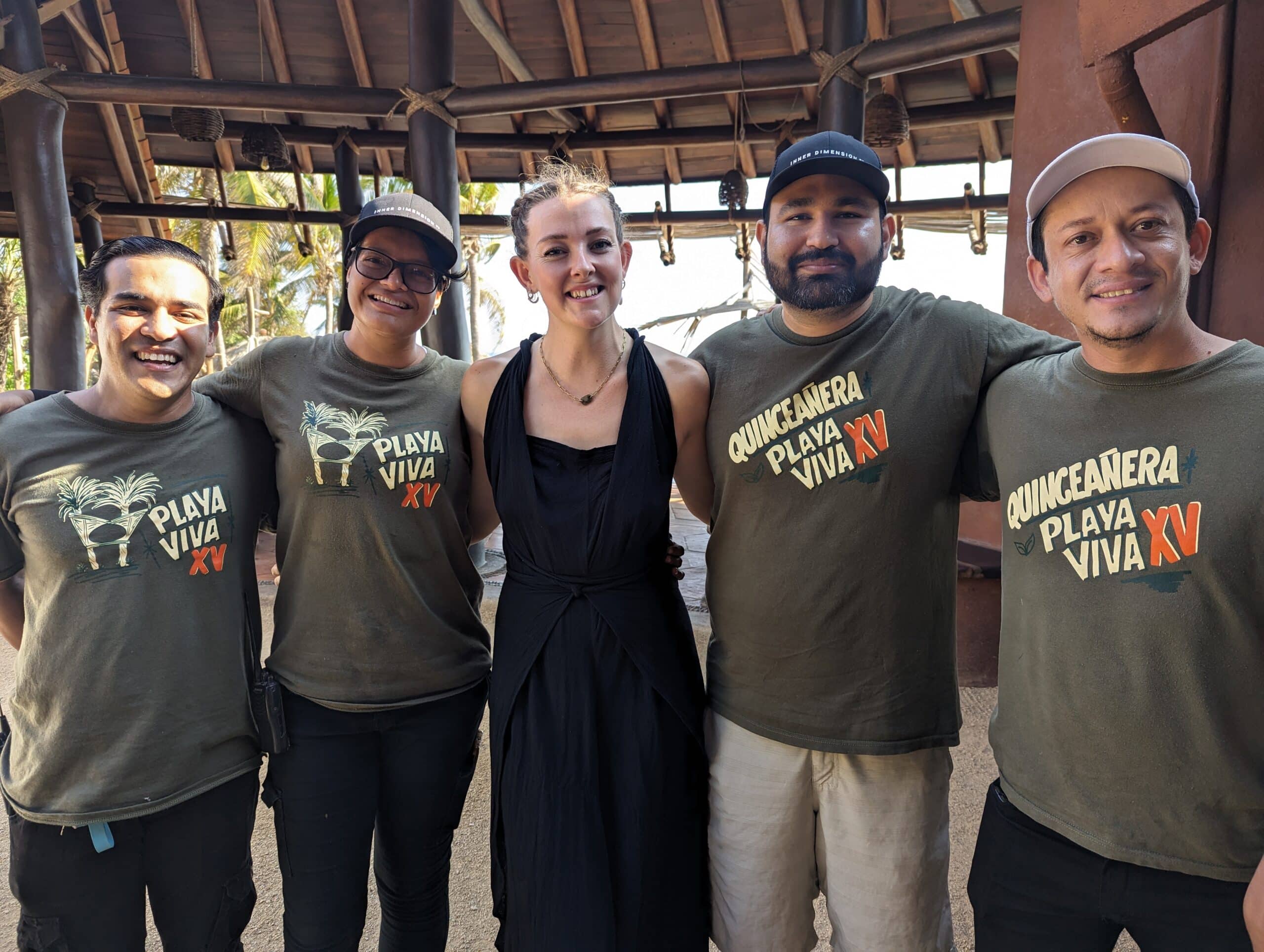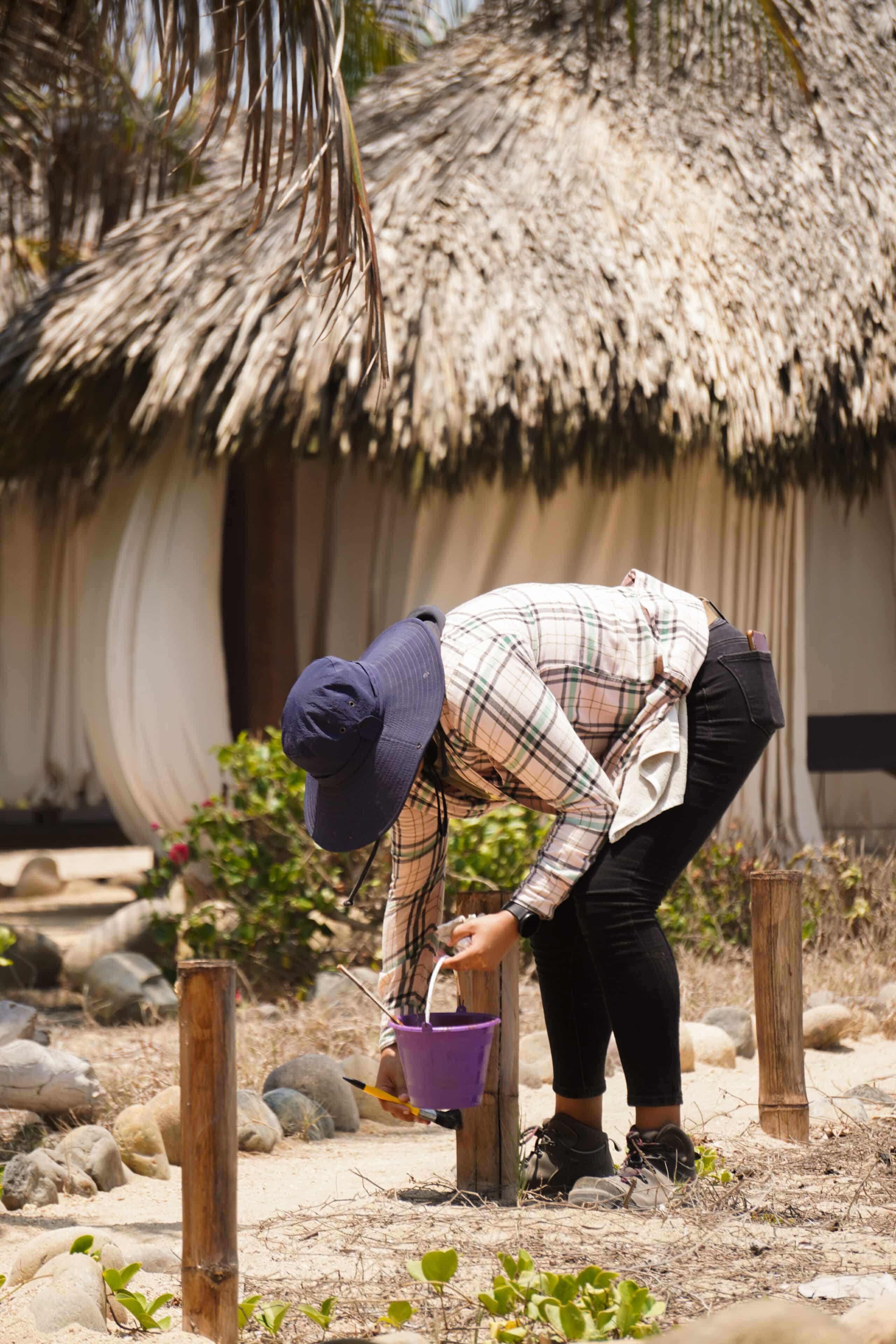At Playa Viva we are working to promote gender equality within the team so statements like the title of this piece are a thing of the past. One woman leading the way for us is Cecilia Vega, who is in charge of the maintenance of the solar systems and power at the hotel. She tells us how since university she has been excelling and challenging gender norms in a job that is traditionally thought to be for “men”, how she arrived at Playa Viva and the impact that this has had on her life.
DAVID: Let’s start from the beginning: Your name, what you do here; and I want you to talk about what it’s like to be a woman and be part of a team that normally has men as its head and what it’s like to be in that environment.
CECI: I’m Cecilia Vega Rauda, I’m in charge of technical maintenance at the hotel. First of all, arriving at the hotel and knowing that I would be surrounded by men is something that I had already experienced, because normally you don’t see a woman in this type of job. Since university I have always been the only woman in the room, Playa Viva is no different. When I arrived I was aware my colleagues had the mindset that a woman doesn’t have the same capabilities as a man, and yes, it was a little difficult to deal with but I think we have moved past it. I got ahead by showing them that I am neither better nor equal to them, but that we can have the same capabilities and we can support each other without having to step on each other’s toes. At the end of the day, we are working towards the same goal, which is to ensure that the hotel is always in the best condition for our guests and operating 100% off-grid efficiently.
DAVID: How did you hear about the role at Playa Viva and when finishing university did you imagine working somewhere like this?
CECI: I heard about the role through an ad on the Facebook page of the university where I studied; Industrial Engineering and Maintenance. I didn’t even know that Playa Viva existed. The director of the university program called me and told me there was a position in a hotel near Petatlán, and when I googled Playa Viva I thought: “Do we have this near here in Zihuatanejo?” I saw the treehouses and things like that and was very impressed, so I sent my resume; and to my pleasant surprise, Julia immediately answered me and the next day I was interviewed by the engineer Alberto.
DAVID: And how did it go?
CECI: Well, it went well. Maestro Alberto asked me several things about myself, he took me to see some facilities that he considered were not finished or in compliance with the norm or safety standards and he asked me questions, about what I could do to correct it; names of things and so on, and then I think he liked me or he saw something in me and now, here I am. When I arrived here and began to see the palapas and that everything was self-sustaining; I liked it a lot; I was excited. I went home to tell my mother that we had this beautiful place so close and how crazy it was we didnt know. I believe it is because national tourism doesnt really recognise the importance of sustainability and international tourists are a bit more educated and therefore attracted to Playa Viva in that respect. This really made me love the project more, instead of destroying this place we are aiming to support it, it is reassuring to know that there are sustainable ways to preserve nature and the world if only we are shown how to do it well.
DAVID: How do you feel about being in charge of the solar system?
CECI: Well, at first it was a challenge because I didn’t know what a photovoltaic system was, but the Engineer Alberto taught me all what I should know in regards to the maintenance part. But I can’t be blind in something, just waiting for the engineer to tell me what to do, I always want the full picture so that’s when I asked Julia if I could have attend a course to gain some extra knowledge on the subject. It was a challenge for me, but I didn’t fear it, I liked it, I liked knowing that they were autonomous, that they had no relationship with CFE (the Mexican energy board). It was a great experience for me and I feel proud to be managing such an extensive system myself and training our team.
DAVID: How would you describe the environment for a woman coming to work here at Playa Viva?
CECI: At first the environment was very tense in my maintenance area, not from the outside of my team, from the outside I saw them thinking, “What is a woman doing there?”, but there was never anyone pointing at me or saying bad things, rather it was like a surprise for them to see a woman in maintenance, but I considered the environment good. Inside maintenance however it was very difficult at first. I would say that it is very difficult to work with someone who has a very deep-rooted way of thinking; maybe from childhood, right? Yes, it was very difficult.
DAVID: Has the situation improved?
CECI: Yes, it has improved, we have a better relationship, I think he has realized that I am not here to take his place, but to support him and for him to support me. Where there is a case that he has more knowledge than me I am happy to ask him, and also, if he has doubts about a topic he approaches me. There is respect there now and we have started to work as I wanted at the beginning, as a team.
DAVID: Tell us about the benefits of working here.
CECI: I like being surrounded by the concept that we have here, I think the feeling of family is evident between the team and guests. We are all supported by the space and there is a feeling of peace all the time, even if you dont know guests or new holistic hosts, they greet you, and they can even hug you and that transmits a lot of good energy to me. I like that there are hostesses who talk openly, who teach you, that if for example you are going through a bad situation, they are there to guide us. I really like the more relaxed working environment that we have of course, some situations I have to resolve with the systems stress me out but mainly, I don’t feel stressed, I really like working here at the hotel.
DAVID: Playa Viva often talks about being a regenerative hotel. What does that mean to you?
CECI: “Regenerative”—that’s a new concept for me. I’d be surprised if I give you the definition you’re looking for, but it’s like taking what we already have in nature and improving it if we’ve damaged it. For example, if we have things that are good for the environment, leave them be or add more, but don’t harm what we already have. I think Playa Viva is on a good path to achieving that. We’ve been making changes, and it’s becoming more evident that we’re using environmentally friendly practices.
DAVID: Are there any practices from the hotel that you now use in your personal life?
CECI: The fact that e paint with earth—I want to do that now. I told my mom that we should paint our family home with earth because it’s eco-friendly. Before, I didn’t pay much attention to what I consumed, but now I’m more conscious of what I eat as well. I try not to consume junk food, though it’s hard, but I try to be healthier. Working here has changed my mindset, and I’m proud to be part of something positive for the environment.
DAVID: In terms of raising awareness, has it raised your awareness in any other way?
CECI: I need it. I think there is a lot of potential for Playa Viva to raise awareness in us, but I think the issue is, we Mexicans are very lazy. So, Playa Viva wants to take away that laziness from us Mexicans. What we could really benefit from is recycling in the towns, I would like to, start to separate plastics, cardboard, things that I can reuse and that are worthless to me because at the moment I throw them away. So I think Playa Viva is here to raise awareness in each one of us, but it is up to each one of us to want to learn or to continue learning what Playa Viva is trying to teach us. It would be great if outside of the hotel, there were things in place which can enable us to engage with good practices in our homes.
DAVID: How can we help with that?
CECI: Maybe having a course every so often in which they give us official figures of what is happening around us in the country; because sometimes Mexicans think: “Oh no, nothing is happening, that will never happen”, but if we give them correct figures, official figures, for example, I heard that: every hour 3 people are dying because of lung damage due to enhaling toxic fumes from burning garbage. That is when they will say… “I am not going to burn garbage in my house anymore, I will use it as fertilizer for the trees instead”, we need to see numbers to start worrying and taking care of what is around us
DAVID: What do you see for the future of Playa Viva and your future?
CECI: I see growth for the hotel and becoming even more cemented in the foundations it has in the sustainability space. I am proud that our practices are not only on paper, we live them everyday, each one of the team feels responsible to meet the standards the hotel has and improve on them. I see the hotel stronger in terms of the environmental impact and I see myself aware of working in a hotel that is experiencing sustainable growth. I see myself growing personally as well thanks to putting into practice each of the values and principles that the hotel is trying to instill in each one of us, such as sustainable, energetic, and companionship practices, as well as being guardians of the Juluchuca community. Little actions we make today, such as picking up trash if you see it lying around, all those good practices that we have been taught since we were little but that we don’t do, are all going to make a sustainable difference in the future.
DAVID: Any final words for those reading this?
CECI: I’d like to say that I’m very grateful for the opportunity to work here and learn. I’m constantly learning every day. It’s been an incredible experience to meet people from different cultures and learn from them. I’m very happy to be part of this team, and I’ll continue working hard to ensure Playa Viva remains a beautiful, sustainable place.


